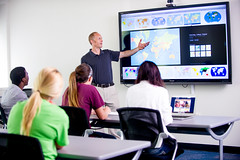Blog Carnival: Teaching And Technology

Today’s article is written for the Reach To Teach Teach Abroad Blog Carnival, a monthly series that focuses on providing helpful tips and advice to ESL teachers around the globe. The host for this month is Rebecca Thering, here you can find other similar articles. I’ll be posting a new ESL related article to this blog on the 5th of every month. Check back for more articles, and if you’d like to contribute to next month’s Blog Carnival, please get in touch with me at dean@reachtoteachrecruiting.com, and I’ll let you know how you can start participating!
Technology is a funny thing, it has grown and grown at a phenomenal speed and we constantly live in a world of progression where technology makes everything easier. But is that the case for teaching?
HELL’S YEA! (kind of)

Technology has advanced how we travel and teach, and as in any profession the advancements of technology have only helped to aid us in our pursuit of making this world awesome (still holding out for a hover-board). And with teaching it can be a useful tool to have in the classroom. But what sets it apart from other technologically dependent professions is that it isn’t an essential tool to have in the classroom.
From my own experience I have worked in two schools, one had embraced the art of fusing technology and teaching, and the other…well not so much. My first position in Bali used technology well; all of their flashcards were in files on a computer that you can access in any classroom, you could create your own lesson plans and have them there as a reference, all of the listening exercises etc were just a click away.
I have to say that this kind of technology did make it easier for me in some ways, and the kids found it a lot more entertaining, technology becomes more and more a part of children’s lives these days, so it was something they could relate to in an engaging way. The cartoon characters that are featured throughout the curriculum to aid in relating to children were no longer just stationary character with a speech bubble on a page. Now they were alive, moving, dancing, talking cartoon characters.
This said it was also limiting in some ways. For example not having a flashcard that you can put face down on the floor, or stick to the wall, or the back of a child’s shirt limited the games. Of course I made my own for these kinds of games but then that went against the notion that technology reduces your work and makes it easier.
My second position as a teacher was in Taiwan and, oddly enough, the technology level at my school was significantly less than in Bali. Which isn’t to say that there wasn’t any, we had a school computer and printer where teachers could use the internet to search for worksheets, game ideas or print-outs. But I found there was a lot more prep time involved for me, I created props and materials in true Ray Mears style, throw me a washing up liquid bottle, sticky tape and popsicle sticks and just see what I can do. I had the freedom of being able to move my materials around the class, but it was more time consuming than my Bali experience.
My teaching in Taiwan was in no way hindered by the lack of technology; in the same way that my teaching was in Bali was in no way enhanced by the technology. It was simply a case of being flexible, which is what all teachers should be. Your merits as a teacher aren’t defined by how much technology or how many materials are there for you, it is your ability to engage your class and deliver the material by whatever means possible.
I suppose my overall view on technology is to use it to bolster your class when you can, if it frees up some of your time then use that free time to get creative. I feel that as a teacher you should never be utterly reliant on technology, this profession was here way before Bill Gates got involved. One of the major features of being an ESL teacher is that you are creative and flexible. So if you are in a school that has zero technology, use what is around you, mime, act, or even field trip the English language into their minds. Check out our article with tips for teaching with limited resources for more help.
What experiences do you have of technology and teaching? Have you worked in a school of the future? Or maybe all you had was a board and chalk. Leave a comment below and share your experiences.



